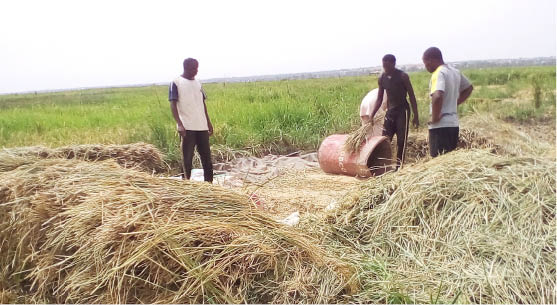WANEP, OXFAM task politicians on ‘Farmers Manifesto’
The West Africa Network for Peace-building (WANEP Nigeria) and OXFAM in Nigeria has urged politicians to work for the implementation of the ‘Farmers Manifesto’ in the interest of food security and national development. The Program Officer, Conflict Prevention/Early Warning, WANEP Nigeria, Osariemen Amas-Edobor, said in a report of “Engagement with political party aspirants on the […]

FILE PHOTO
The West Africa Network for Peace-building (WANEP Nigeria) and OXFAM in Nigeria has urged politicians to work for the implementation of the ‘Farmers Manifesto’ in the interest of food security and national development.
The Program Officer, Conflict Prevention/Early Warning, WANEP Nigeria, Osariemen Amas-Edobor, said in a report of “Engagement with political party aspirants on the Farmers Manifesto in Kebbi and Bauchi states”
According to her, Small Scale Farmers (SSFs) in Nigeria make up the greater number of the country’s workforce population and produce over 80 percent of the food consumed in the country.
She said the Nigerian agricultural sector is second largest contributor (about 24 percent) to the nation’s Gross Domestic Product (GDP), but that nonetheless, these farmers appear to be the poorest constituency in Nigeria.
She said since the birth of Nigeria’s democracy, countless campaign promises have been made on transforming the agricultural sector yet Small Scale Farmers have not been adequately supported over the years by successive administrations in Nigeria.
“Their voices are scarcely heard, neither are they adequately represented in policy-making process and in governance. This constituency has also been excluded and dis-empowered, while their concerns and interests are not taken into account or addressed. Ironically, this is the same constituency that the politicians run to with different kind of promises campaigning for votes during elections even as the 2019 elections approaches,” she said.
She said it is in recognition of the challenges faced by SSFs in Nigeria that Small Holder Farmers Groups (SHFGs) now rises to organize and link up with relevant national platforms with a view to enhancing their voice and increasing their capacity to influence policies in and out of the agricultural sector resulting to the development of a Manifesto.
“The Farmers’ Manifesto is a documentation of the specific needs of Nigerian farmers as a basis for a bargain between farmers and political office seekers, prior and after elections. The programme was organized to create a platform were SSFs engage public office seekers from all political parties in Kebbi State on key issues as it affects the agricultural sector and their specific needs as outlined in the Farmers’ MANIFESTO, even as the 2019 general election draws closer,” she said.
She said due to the development, the WANEP-Nigeria and OXFAM engaged with Political Party Aspirants in Kebbi State on the Farmers Manifesto.
She said traditional leaders, political party aspirants, Ministry of Budget/Planning, and Small Scale Farmers across Danko, Jega and Birnin-Kebbi LGA’s of Kebbi State among others were in attendance.
She listed the objectives to include, to promote issue-based elections by driving local and state-level conversations on issues relating to agriculture, most especially smallholder farmers in the state; facilitate the setting of development agenda priorities for political office seekers in Kebbi State that will serve as basis for post-election advocacy in demand of fulfillment of their promises; and raise awareness among the general public, the media, the middle/upper class about the importance of smallholder farmers in the Nigeria Project, and why their needs must be factored into the development agenda at the State and Local Government levels in Kebbi State.
The key outcome of the engagements include, nine political party aspirants (governorship, House of Assembly and Representatives) across two political parties in the state signed the Farmers Manifesto, committing to specific demands to boost agricultural productivity) in the state.
